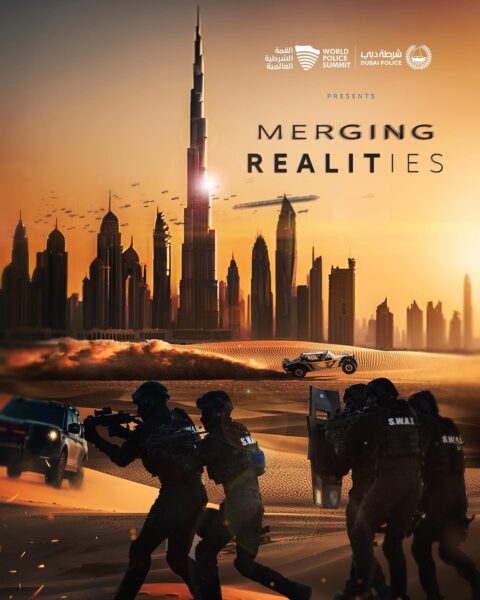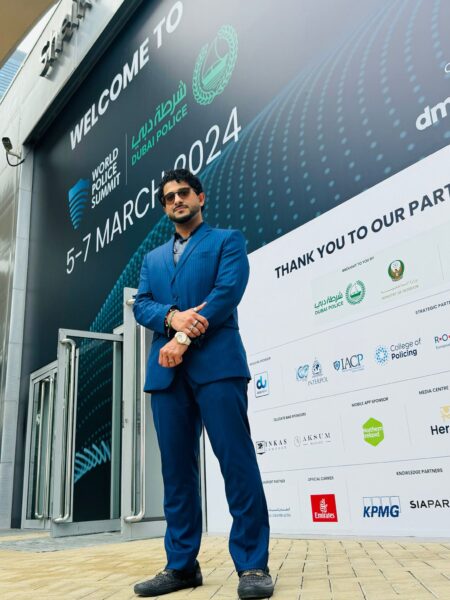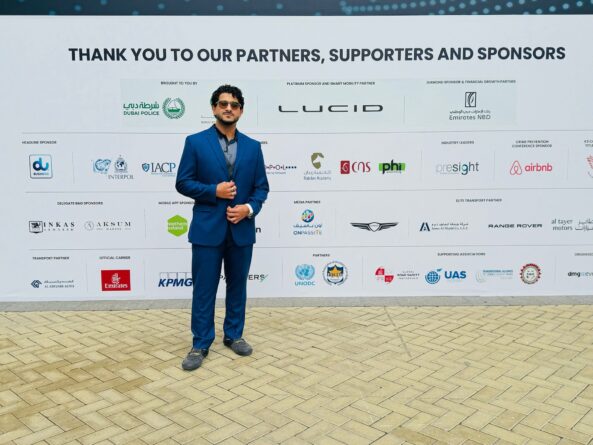Throughout the history of cinema, filmmakers have always pushed the medium to its limits. Experimenting with new techniques and exploring ideas that were once thought to be impossible. From introducing movies with sound to utilizing state-of-the-art cameras that bring sparkling detail to the screen, cinematic technology has always been evolving. For filmmakers like Uzair Merchant, that’s just the way they like it.
With years in the film industry, Merchant isn’t exactly a stranger when it comes to pushing boundaries. After starting his career working in the art department on films such as Deadpool 2, Skyfall, and Star Trek Beyond, Merchant has made a name for himself as a filmmaker looking to take chances. His latest project, Merging Realities, just might be his biggest gamble yet.

Merging Realities is a multi-format project that combines holographic imagery and cinematic sequences with live action. The project was in partnership with the Dubai Police in an effort to show off its ‘Welcome to Policing 5.0’ slogan. The film portrays a sci-fi-inspired world of Dubai and the technological advances that await in the near future.
Merchant sat down with us to discuss how his background in production design has influenced his approach to telling authentic stories, the challenges he faced while making Merging Realities, and the future he envisions for the film industry.
Matthew Swigonski: You’ve worked inside the art department on plenty of blockbuster movies. Has that experience given you a unique perspective as a filmmaker?
Uzair Merchant: Absolutely. My background is in production design and so I went to university for that very reason. The most influential filmmakers to me came from the art department such as James Cameron, Alfred Hitchcock, Ridley Scott, and Tim Burton. These guys all kind of spiraled out from there. So for me visually, I think you can break down and understand the film in that depth and detail of bringing words to life. Then if you work with the right people, I think it becomes easy to tell a story.
Matthew Swigonski: You mentioned directors like James Cameron and Tim Burton. Do you have any other inspirations that may have pulled you into the world of filmmaking?
Uzair Merchant: When my mom was pregnant with me, she was on a film set. So I always say the industry picked me. For me, telling stories was a way of putting all of what I did in one place. I started out with music back in the day. Then in the early 2000s, I used to VR game test when no one knew what VR was. I then coded and built computers and did live sound. And so all those skills of tech and music and photography was like, ‘Okay I want to put this together.’
I grew up around the workshop. My dad was an interior designer. So building kind of came naturally to me in that sense. And then there was this hunger inside of me for being able to tell those stories in the most honest way possible. There was this moment inside me where I was like, ‘Hey, you know, I want to tell these honest stories. But from people that don’t have a voice.’ And to me, as an Indian-originated filmmaker, that’s what drives me every day. There’s a billion people out there that will never get a voice and I want to find and tell their stories.
Matthew Swigonski: Can you talk about Merging Realities and how you got involved in the project?
Uzair Merchant: A good friend of mine owns this company called Bold Film, and they work closely with the Dubai Police. And so, there was this thing happening, which is called the World Police Summit. I got called in literally at the last minute and they were like, ‘Hey, we have a day and a half to write this script.’ I ended up doing it and then bringing together an immersive experience that was very unique because we used a holographic screen, which was one of the first ever built in this sense. These long screens are over 20 meters long and then take these holograms mixed in with film and live on-stage action. In my head I was like, ‘Okay we can push this way further,’ but then we kind of scaled back. I wanted to go way further but I was really happy with how it turned out.

It’s very unique because in this region they pride themselves in the technology and how they push this technology, especially in Dubai. And I think this was a case of us doing it rather than just talking about it because we brought you a 3D world without you wearing 3D glasses. I think that was very unique in the way the storytelling was completely cinematic. We were trying to send the message because it’s about a young girl’s heart. It’s about how ‘This Is Policing 5.0.’ How we all come from mind, body, and soul and we beat as one entity. We are beating as one entity and we do belong to the same planet. So putting all those things together, I think makes it a very unique storytelling project.
Matthew Swigonski: So do you think holographic imagery has more practicality than say 3D, which has had a few different iterations throughout the past 30-40 years? It always seems to have this peak but then it quickly goes away. Do you think holographic imagery has more of an ability to stick around or have more viability in the long run?
Uzair Merchant: We’ll soon be living in a world where, if you remember in Star Wars, having that 3D person in the room without being there. We’re right on that verge man. It’s just about the actual devices being able to do that. You know, we’re going from a time when you could only talk on the telephone to the first text message to the internet to FaceTime.
Now in two or three generations people are not only gonna be able to physically see the person but then they’ll even be able to feel the person. So you’ll probably shake hands with this holograph. I think we’re not far from there. I think that the tech is moving so quickly with AI. It’s going so fast with us being able to push boundaries.
Matthew Swigonski: In terms of those boundaries, do you ever think that with our usage of AI that our storytellers may be in danger of losing their heart or soul?
Uzair Merchant: It’s funny that you mentioned heart and soul. AI doesn’t have a soul. You can have AI paint an exact replica of a Picasso or a Van Gogh. But are you gonna tell me it’s worth that much? No. It’s exactly the same down to every pixel. But what is it lacking? It’s lacking an emotional transfer that artists bring and I think that’s what makes art beautiful. It comes from an artist’s perspective. You are consciously trying to use your medium to transfer a certain idea.
AI is just thinking about going from A to Z. It’s not worried about what’s in between. Whereas when you’re making your film things can happen. You can go through bad weather, you can go through people not showing up or someone falling sick. Then it becomes what it becomes. It becomes art in itself and we’ve seen that through time. Films make mistakes, and those mistakes become pop culture. We strive for perfection but we will never find it.
Matthew Swigonski: What was the greatest challenge you faced during the production of Merging Realities?
Uzair Merchant: Time frame. The time frame was terrible, man. It was so tight. It was like we were turning in scripts during the day and shooting it in the afternoon. There was also a storm, this massive storm. So it was supposed to be like a full day shoot, they cut it in half and we had to go make it work. We just had to adapt. It was a wild run.
Matthew Swigonski: Taking the conversation towards more on the animation side, we had films back in the 90s like Toy Story that kind of pushed the limits of animation. Then a few years ago we had Spider-Man: Into The Spider-Verse which has really opened up animation as of late. Do you think that holographic imagery is going to have an impact on animation as well? How far do you think technology can push what animators are able to do?
Uzair Merchant: I think the answer to that is a different question. What are filmmakers and storytellers trying to make people experience? That’s the question because I think there’s so much of the tech available. It’s all possible. I think if filmmakers can go and ask the intention to themselves you’ll get the answer. I pride myself on social realism and I live by the motto, ‘If I can unlock a million minds, I would have created a billion possibilities.’ That is how I live as a filmmaker.

I want to tell stories that people can understand and for them to connect to. And it doesn’t have to be a superhero every time because you know, real heroes don’t wear capes. I’m gonna push a lot as a filmmaker. We have a film that’s coming up called Hidaayah, which I’m in the process of pre-production. It is a true story of an Imam in Canada who was wrongly addicted to opioids by the medical system and how he had to come out the other side.
You know you have millions of kids who are sitting down at a certain place where Batman is not going to inspire them. Being able to go and tell a story or being able to share something, where they go, ‘Oh yeah, I can see a bit of myself there.’ I think that is the real power of cinema.
Matthew Swigonski: When developing stories are you just focused on the story itself as opposed to what audiences might want to see?
Uzair Merchant: It’s both. Yes, it’s about what the audience wants to see but also sometimes people don’t know what they want. At some point, you have to put your thinking cap on as a producer or a creator and figure out what works and what doesn’t. But I really think that at the end of the day, you have to be true to the story.
Matthew Swigonski: If there’s one thing that you could go back in time and tell your younger self, what would it be?
Uzair Merchant: The one thing I would tell myself in my younger days would be to take more risks. And that idea is just because that’s what I’m doing for younger kids nowadays. Helping to empower them to take more risks. So I would go back and tell myself, ‘I know it’s scary. Good job.’ Because you never know until you try.
Source link
[Interview] Uzair Merchant Big Gamble In ‘Merging Realities’ #Interview #Uzair #Merchant #Big #Gamble #Merging #Realities
Source link Google News
Source Link: https://www.bubbleblabber.com/2024/06/filmmaker-uzair-merchant-merging-realities/